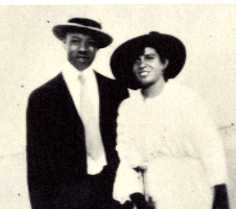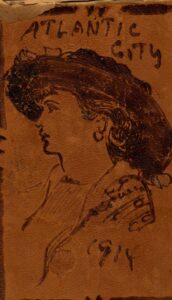YOUR DAILY DOSE OF EUBIE
Beginning around 1910, Eubie spent at least part of each summer playing the clubs and bars in Atlantic City. The town was a hopping summer resort during this time. “High society” from as far south as Washington and north to New York City and its environs would escape the heat there. The vibrant night life scene there attracted major pianists from the same area, including younger players like James P. Johnson and Fats Waller, and legends like Luckey Roberts.
The clubs catering to blacks (and slumming whites interested in black culture) were all centered in a district about 20 blocks from the ocean. Eubie worked at several spots, notably Kelly’s, which was typical of many small clubs in the area. Willie “The Lion” Smith recalled it as having a bar in the front room and a backroom with tables seating about 70 or so customers. In clubs like this, Eubie was exposed to a higher caliber of competitor. He developed his own set of “tricks” in order to keep them at bay, which led to his first original compositions. While it’s impossible to date specifically these pieces, it’s likely that Eubie was already performing “Charleston Rag” (which, although he claimed he “composed” in 1899, more probably was developed around a decade later) and showstoppers like “Tricky Fingers” and “Troublesome Ivories.” While primarily hired to accompany the house vocalists, Blake would play these pieces when they took a break.

One person who accompanied Eubie there was his soon-to-be-wife, Avis Lee. Before the marriage, Eubie had to pass muster with Avis’ grandmother, who was skeptical about his ability to support her. “I make fifty-five dollars a week,” Eubie assured her, ”I can take care of her. She ain’t going to spend more than fifty-five dollars a week.” (This was before tips; in 1910, the average worker was making .22 cents an hour, or about $10-$11 a week.) Avis was skeptical about Eubie’s intentions, so Eubie approached Joe Gans’ wife Martha, who had attended high school with Avis, to put in a good word for him. Apparently that did the trick, and Avis agreed to travel with Eubie to Atlantic City in the summer of 1910. Although Avis was two years older than Eubie, she looked considerably younger, leading one of his employers to express concern that Eubie might be charged with transporting a minor across state lines. Perhaps for this reason, the couple quickly married, and Eubie carried their marriage certificate with him wherever he performed, to show that their marriage was legitimate.
Among the pianists who carefully studied Eubie’s pianistic tricks was young James. P. Johnson. “Still in short pants,” according to Blake, Johnson would sit next to Blake and “cop” his better tricks. At the time, Eubie ranked Johnson as a good working pianist, a “good house-rent player,” but not of the first rank. However, Eubie came to regret teaching his better pieces like “Troublesome Ivories” to Johnson: “I’m sorry today that I used to play it for him, because he’d play it twice as fast as I could…” While he had a longer reach than James P., Johnson “could speed faster [with his smaller hands], you don’t have so far to go.”
Johnson was suitably impressed with Eubie’s skills when he first encountered him in the summer of 1914: “I went for a visit to Atlantic City and heard Eubie Blake…one of the foremost pianists of all time…Eubie was a marvelous song player. He also had a couple of rags. One, “Troublesome Ivories,” was very good. I caught it. I saw how Eubie…could play songs in all keys, so as to be ready for any singer—or if one of them started on a wrong note. So, I practiced that, too.”

Also on the Atlantic City scene was Charles “Luckey” Roberts. Born in Philadelphia approximately the same year as Eubie (like Eubie, Roberts gave different stories at different times as to his actual birthdate), Roberts was one of the most accomplished of the East Coast pianists. His first hit came in May 1913 with the publication of “Junk Man Rag.” Luckey said in one interview that he originally composed the piece in 1901 – perhaps like Eubie pushing back the composition date to make the feat seem even more remarkable. Unlike Eubie’s “Charleston Rag,” judging from an early recording by Roberts, Luckey’s piece depends far more on “tricks” in the right hand, such as rapid sweeps up the keyboard, and borrows more heavily from standard figures heard in other early ragtime and jazz compositions.
“Junk Man” became a hit when its publisher, Joseph Stern, had lyrics added to it. Eubie noted that he began to hear it performed on Baltimore’s streets by local organ grinders, a sure sign of its popularity. Following its success, Roberts arranged for Eubie to have his first two published rags with Stern, “Chevy Chase” (promoted as “a rag”) and “Fizz Water” (labelled by the publisher as a “fox trot”).